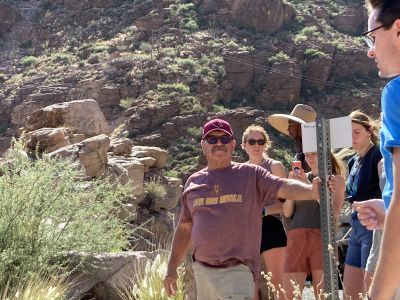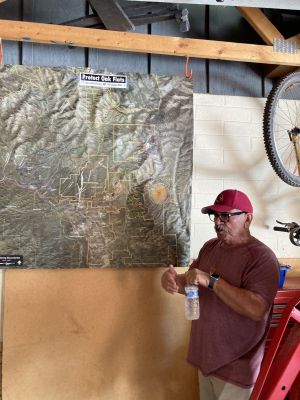
Manny Villanueva wrote these reflections about our visit with a retired miner and a tour of his town:
“Our group got the opportunity to talk to Henry Muñoz, a retired miner with more than a decade of experience and expertise.
Henry is from Superior, Arizona, which is where we met him for a discussion on mining and how it is affecting the surrounding community and the environment.
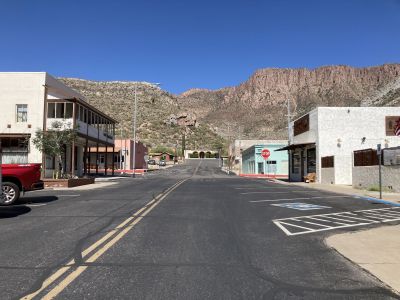
For the people of Superior, mining was a popular way to make money and provide for their families. But the town began to experience a “boom and bust” pattern. If the mines were doing well and copper prices were high, the town would thrive. If prices fell or the mines weren’t doing well, the town would be met with some economic struggles.
Henry had a quote which sums up the nature of the mines. “You know the mines; they are not a for sure thing.” The mines may make financial gains in the beginning, but when mining operations become careless, they are not sustainable for the community or the environment.
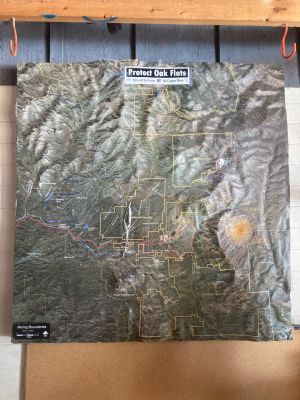
That’s what Henry is trying to push back against with his group called “Concerned Citizens and Retired Miners Coalition.” Resolution Copper is the mining company that is trying get a hold of the property called “Oak Flats,” a campground within the Tonto National Forest where people can go and visit for recreation. The property is located close to Superior, about 15 minutes away. Oak Flats is also held at a high level of importance to indigenous groups, specifically the Apache people.
What surprised me was the effect that the proposed mining operations could have on the people and environment in the area. Communities within the projected mining area could experience water pollution. There is also a potential biological effect concerning the plants and animals. Finally, this operation would take away from the culture of the Apache people. Transferring this public land to a private company would represent a negative act toward the Apache people, who have been experiencing these types of things for many years. These were just a few of the effects on the area.
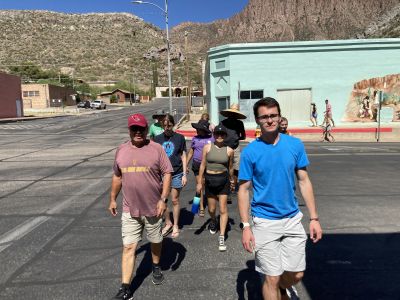
We were able to get a tour of the town of Superior. Henry is a very knowledgeable person on mining and the town in which he resides. We were shown the different places that used to be popular, or how Henry described “used to be bustling.” There were areas for boxing matches, bars, and hang out spots to escape the Arizona heat. We learned how mines used to be a base of revenue for the town of Superior but now the operations are not sustainable or good for the people or environment in the long run.
Henry was able to educate himself about the ins and outs of the proposed Resolution Copper operation and the effects they could have in the area. The U.S government has agreed to the land transfer for Resolution Copper but it is on hold because of the environmental impact statement from the U.S Forest Service, currently under review.
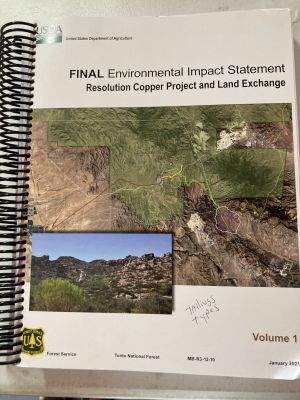
I was able to talk with Henry and ask him questions about his work and what he is trying to accomplish. One thing that came up was the people/activists he studied and admired. Henry was able to meet and talk to Cesar Chavez who was a leader of the United Farm Workers union and worked toward better working conditions for field workers. The advice that Chavez gave to Henry was “educate your people.” I found these words to be an important component when trying to stand up for an important cause. I also saw this theme with our other speaker, Wendsler Nosie, who is also pushing against the mining operation. The time with Henry was very educational and inspirational.
In closing, educating people is a way to advance, but also to maintain a level of care and awareness for the things that are taking place around us.”
















